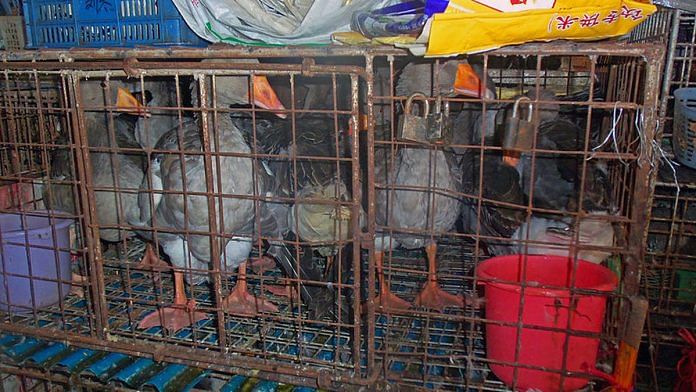New Delhi: China has reopened its wet markets after declaring victory in its fight against the coronavirus even as the pandemic rages on globally, having killed over 50,000 and infected lakhs across the world so far.
The viral outbreak is thought to have begun in China’s Hubei province, where numerous cases were reportedly linked to a now-shuttered wet market known as the Huanan Seafood Market.
The Chinese government’s decision has been criticised by many, including Australian Prime Minister Scott Morrison and US Senator John Cornyn.
Several reports said these markets are now operating exactly the same way as they did before the coronavirus pandemic.
So, what are wet markets are and why these are believed to have the potential to cause diseases like Covid-19.
Also read: China’s love for wildlife meat to its authoritarianism — how coronavirus got out of hand
What are wet markets?
Wet markets are places where animals, dead or alive — ranging from birds, fish, bats, rabbits, turtles and reptiles (mostly snakes) — are sold for human consumption.
The word comes from the melting ice that is used to preserve meat, as well as the constant washing of the market floors when they are covered in blood that spills when an animal is butchered.
The markets are found throughout the world, but it is majorly an Asian phenomenon where dead and alive animals, including wildlife, are stocked to be sold. Different animals are commonly caged together in narrow lanes and under open skies where consumers flock regularly in large numbers to buy meat.
Why wet markets are in focus
At a press briefing in January, Gao Fu, director of the Center for Disease Control and Prevention in China, had said origin of the new coronavirus can be traced to wildlife sold illegally at a Wuhan seafood market.
The SARS virus, which had killed close to 800 people across 29 countries between 2002 and 2004, was also reported to have originated from wet markets in China’s Guangdong.
After the SARS outbreak, a temporary ban on these markets and the wild animal industry was put in place in July 2003. But it was lifted in August the same year after the World Health Organization (WHO) declared that the virus had been contained.
Also read: Did pangolins transmit coronavirus to humans? Could be, but scientists still not sure
Demand for crackdown
Experts have predicted that wildlife markets in China are a very efficient breeding ground for new zoonotic viruses which can transfer from animals to humans.
The live and dead animals, including a variety of wildlife and endangered species, are often kept together in wet markets raising the possibility of deadly outbreaks.
A petition was recently launched by the People for the Ethical Treatment of Animals (PETA) urging WHO to shut down wet markets around the globe in order to prevent future pandemics.
Several experts have also called for a ban on these markets, claiming the domestic food laws are not up to the standard of health, safety and welfare of people.
Dr Christian Walzer, executive director of the Wildlife Conservation Society health programme, has been quoted as saying: “If these markets persist, and human consumption of illegal and unregulated wildlife persists, then the public will continue to face heightened risks from emerging new viruses, potentially more lethal, and the source of future pandemic spread.”
Australian PM Morrison Friday said, “From a world health point of view, I think this is something the WHO should do something about.”
Also read: Ticking ‘time bomb’: Study predicted re-emergence of ‘SARS-like virus’ 13 years ago




The world should get United and ensure effective sanctions and excommunicated